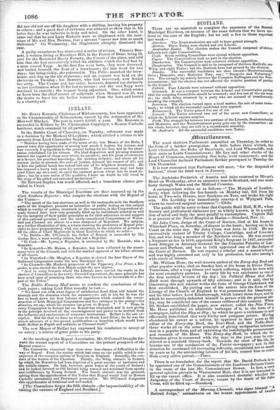IRELAND.
Mr. Henry Kemmis, Chairman of Kildare county, has been appointed to the Chairmanship of Kilmainham, vacant by the resignation of Mr. Maxwell Blacker. The post is worth 2,000/. a year. Mr. Kemmis is succeeded in Kildare by Mr. Christopher Coppinger, a Roman Catholic barrister, much esteemed by all parties.
In the Dublin Court of Chancery, on Tuesday, reference was made to a decision by Sir Michael O'Loghlen ; which elicited a tribute to his memory from Lord Chancellor Sugden-
" Mention having been made of the name of the late Master of the Rolls, I cannot omit this opportunity of stating bow much I deplore his decease, and how sincerely I sympathize in the general feeling for his loss, and in the admi- ration entertained for his virtues. His kind disposition and pleasing manners insured the regard of those over whom he presided ; and his great attainments as a lawyer, his practical knowledge, his untiring industry, and above all his earnest desire to promote the ends of justice, demand the respect of all; and in him the judicial bench has indeed lost one of its brightest ornaments. He has imposed a heavy task upon his successor. That successor may not hope (and I dare say does not) to excel the eminent person whose loss we must de- plore; but by a rare union of like qualities, I have no doubt he will tread in the steps of his gifted and esteemed predecessor."
Sir Edward Sugden was much affected, and a breathless silence pre- vailed in Court.
The results of the Municipal Elections are thus summed up by the Cork Southern Reporter; who couples the elections with the Repeal of the Union- " The result of the late elections, as well in the metropolis as in the Southern parts of the kingdom, .presents an indication of public feeling on this subject which is worthy of notice, inasmuch as the vacancies, in the Corporations al- ready formed have been very generally filled up by individuals selected as well for the integrity of their public principles as for their adherence to and support of this national question ; and the newly-constituted Corporations of W ater- ford and Clonmel are almost to a man composed of Repealers. We subjoin, as a further illustration of this, a return showing the preference of Repeal prin- ciples to have preponderated, with one exception, in the selection of persons to fill the office of Chief Magistrate in those localities to which we refer- " In Dublin—Mr. O'Connell, the father of Repeal, is succeeded by Mr. George Roe, a most worthy citizen, but not a Repealer. " In Cork—Mr. Lyon; a Repealer, is succeeded by Mr. Beamisb, also a Repealer.
" In Limerick—Mr. Ronan, a Repealer, has been reelected by the unani- mous voice of the Council, and with the marked approval of his fellow-citizens of all classes.
"In Waterford—Mr. Meagher, a Repealer, is elected the first Mayor of the Reformed Corporation under the new Municipal Act. "In Clonmel—Mr. Hackett, proprietor of the Tipperary Free Press, a Re- pealer, is also elected the first Mayor under the new regime. " And in every instance where the Liberals have carried the wards in the election of Councillors in the newly-formed Corporations, the same principle has been acted upon of returning those who were known to be favourable to a Re- peal of the Union."
The Dublin Evening Mail seems to confirm the conclusions of the Cork paper ; taking Lord Eliot roundly to task- " We know not with what degree of satisfaction Lord Eliot will behold the triumph and the stimulus which his measure—we call it his, for he was the first to break down the firm balance of opposition which resisted the recon- struction of Irish Municipal Corporations and free entrance to the enemy—the stimulus, we say, which his measure has given to Repeal. • • • Thus, in every Corporation in Ireland but OXE Repeal has triumphed, and is now giving to the pnnciple involved all the encouragement and power to be derived from the influence and emoluments of corporate institutions. Belfast is the one ex- ception. But for that we have no reason to thank Lord Eliot ; for he was the stanch advocate of a five-pound qualification—a franchise which would have made Belfast as Popish and seditious as Clonmel itself."
The new Mayor of Belfast has expressed his resolution to accept of no salary ; a source of great pride to his party.
At the meeting of the Repeal Association, Mr. O'Connell brought for- ward the second report of a Committee on the present prospects of the Repeal cause— The Committee conceived that there were four classes of difficulties in the way of RepeaL First, the apathy which had come on the public mind in con- sequence of the complete success of Toryism in England. Secondly, the con- duct of the leaders of the Chartists. Thirdly, the Whig obstacle in Ireland, by which the Repealers bad been deprived of a great number of barristers and the middle-classes. He had, however, great hopes of the youth of Ireland ; and he looked forward to Old Ireland being rescued and redeemed from apathy and indifference by Young Ireland. The fourth obstacle was the greatest, arising from the apprehension of the Tories that Repeal would lead to Roman Catholic ascendancy and Protestant persecution. Mr. O'Connell designated this apprehension as irrational and unfounded.
[The Committee forgot the fifth obstacle—the impracticability of ob- taining the consent of England and Scotland.]


























 Previous page
Previous page